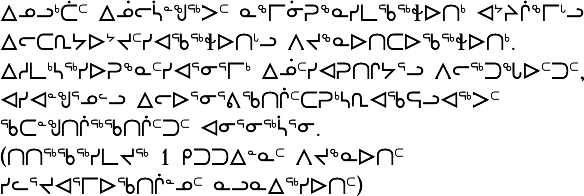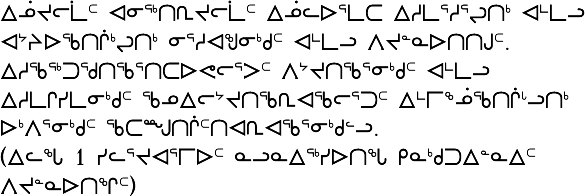Inuktitut is an Inuit language spoken mainly in northern Canada, specifically in parts of Newfoundland and Labrador, Quebec, the Northwest Territories and Nunavut. According to the 2011 census, there are 34,000 speakers of Inukutitut, which is also known as Eastern Canadian Inuktitut.
The name Inuktitut is used to refer to all the Inuit languages of Canada. The names Inuvialuktun, Inuinnaqtun, and Inuttut are also used to refer to Inuit languages spoken in specific areas.
Inuktitut has official status in Nunavut, along with Inuinnaqtun, English and French. Inuktitut has legal recognition in Nunavik (ᓄᓇᕕᒃ) in northern Quebec, and is used as the medium of instruction in Nunavik schools. In Nunatsiavut, an autonomous area of northern Newfoundland and Labrador with a majority Inuit population, Inuktitut has some official recognition.
Inuktitut immersion programs for pre-school, primary and seconday education were introduced in Nunavik in the early 2000s. Since 2012, a college in Iqaluit, in Baffin Island, has been training teachers to teach in Inuktitut.
The Inuktitut syllabary was adapted from the Cree syllabary in the late 19th century by John Horden and E. A. Watkins, missionaries from England. Edmund Peck promoted the use of the syllabary across the Canadian Arctic, and also translated the Bible into Inuktitut, and wrote an Eskimo Grammar and an Eskimo-English Dictionary.
In 1976 the Language Commission of the Inuit Cultural Institute approved two standardized writing systems for Inuktitut in Canada: one using the syllabary and the other using the Latin alphabet.
Today the Inuktitut syllabary, which is known as titirausiq nutaaq (ᑎᑎᕋᐅᓯᖅ ᓄᑕᐊᖅ) or qaniujaaqpait (ᖃᓂᐅᔮᖅᐸᐃᑦ), is used mainly in Canada, especially in the territory of Nunavut (ᓄᓇᕗᑦ), the population of which is 85% Inuit, and in Nunavik (ᓄᓇᕕᒃ), Quebec. The Latin alphabet, known as qaliujaaqpait is used in other parts of Canada.
In September 2019 the Inuit Tapiriit Kanatami / ᐃᓄᐃᑦ ᑕᐱᕇᑦ ᑲᓇᑕᒥ (ITK), an organization the protects and advances the rights and interests of Inuit people in Canada, agreed on a standard way of writing the Inuit languages of Canada with the Roman alphabet. It is known as the Inuktut Qaliujaaqpait writing system, and is intended to provide an alternative, auxiliary writing system that can be used as well as, or instead of, the existing systems. More information.

Download a script chart for Inuktitut (Excel)
Hear how to pronunce Inuktitut:

Inuluktaat inuulisaannguqput nangminiirungnasimaqaqɬutik ajjigiingmiglu ilitarijaujjutsiaqaqɬutiglu pijungnautitauqaqɬutik. Isumaksaqsiurungnatsiarnirmik inuutsiarutigijarlu piliqtungauttut, asianngurnullu iliurnirviqatigiittaruksariaqaraluaqput qatanngutigiiqqatigiittut anirniqsaarni.
(Titiqqaqsimajuq 1 Kitutuinnat pijungnautit silarjuarmiuqatigiinnut nalunaiqsiutit)

Inuujulimaat aniqtirijulimaat inuulaurmata isumarsurlhutik ammalu ajjiuqatigiiklhutik nirsuangunikkut ammalu pijunnautitigut. Isuqaqtuqutiqartitauvalirput pijjutiqarnikkut ammalu isumagisimanikkut qanuilijjutiqariaqalirtut immingnuuqatigiiglutik ukpirnikkut qatanngutigiittiariaqarnikkullu.
(Ilanga 1 Silarjuarmiut nalunaiqsiutinga kinakkutuinnait pijunnautingit)
All human beings are born free and equal in dignity and rights. They are endowed with reason and conscience and should act towards one another in a spirit of brotherhood.
(Article 1 of the Universal Declaration of Human Rights)
Information about Inuktitut | Phrases | Numbers | Tower of Babel
Information Inuktitut and Nunavut
https://en.wikipedia.org/wiki/Inuktitut
http://www.tusaalanga.ca
http://www.nunavut.com/nunavut99/
http://members.shaw.ca/kcic1/nunavut.html
http://www.chass.utoronto.ca/~inuit/
Information about the Inuktitut Syllabary
https://en.wikipedia.org/wiki/Inuktitut_syllabics
http://www.languagegeek.com/inu/inu_syllabarium.html
http://www.translitteration.com/transliteration/en/inuktitut/canadian-aboriginal-syllabics/
Online Inuktitut lessons
http://www.tusaalanga.ca
Inuktitut Dictionary
http://www.livingdictionary.com
Inuktitut phrases
https://www.uaf.edu/anlc/resources/phrases/
https://www.youtube.com/watch?v=iPGAbctSHuY
http://wikitravel.org/en/Inuktitut_phrasebook
http://icor.ottawainuitchildrens.com/node/15
http://icor.ottawainuitchildrens.com/node/60
Inuktitut fonts
http://www.wazu.jp/gallery/Fonts_Inuktitut.html
http://www.nunavut.com
http://www.evertype.com/software/apple/
Inuktitut online radio
http://www.cbc.ca/north/programs/
Nunatsiaq news (in English)
http://www.nunatsiaq.com
Nunavut Arctic College (in Inuktitut & English)
http://www.nac.nu.ca
Government of Nunavut (in Inuktitut, French & English)
http://www.gov.nu.ca
Nunasoft - Inuktitut software and other resources
http://www.nunasoft.com
Aleut, Alutiiq, Greenlandic, Inuinnaqtun, Inuktitut, Inuktun, Iñupiaq, Sirenik, Yup'ik (Central Alaskan), Yupik (Central Siberian)
Blackfoot, Carrier, Chipewyan, Cree (East), Cree (Moose), Cree (Plains), Cree (Swampy), Cree (Woods), Inuinnaqtun, Inuktitut, Naskapi, Ojibwe, Oji-Cree
Ahom, Aima, Arleng, Badagu, Badlit, Basahan, Balinese, Balti-A, Balti-B, Batak, Baybayin, Bengali, Bhaiksuki, Bhujimol, Bilang-bilang, Bima, Blackfoot, Brahmi, Buhid, Burmese, Carrier, Chakma, Cham, Cree, Dehong Dai, Devanagari, Dham Lipi, Dhankari / Sirmauri, Ditema, Dives Akuru, Dogra, Ethiopic, Evēla Akuru, Fox, Fraser, Gond, Goykanadi, Grantha, Gujarati, Gunjala Gondi, Gupta, Gurmukhi, Halbi Lipi, Hanifi, Hanuno'o, Hočąk, Ibalnan, Incung, Inuktitut, Jaunsari Takri, Javanese, Kaithi, Kadamba, Kamarupi, Kannada, Kawi, Kharosthi, Khema, Khe Prih, Khmer, Khojki, Khom Thai, Khudabadi, Kirat Rai, Kōchi, Kodava Lipi, Komering, Kulitan, Kurukh Banna, Lai Tay (Tai Yo), Lampung, Lanna, Lao, Leke, Lepcha, Limbu, Lontara/Makasar, Lota Ende, Magar Akkha, Mahajani, Malayalam, Meitei (Modern), Manpuri (Old), Marchen, Meetei Yelhou Mayek, Meroïtic, Masarm Gondi, Modi, Mon, Mongolian Horizontal Square Script, Multani, Nandinagari, Newa, New Tai Lue, Ojibwe, Odia, Ogan, Pahawh Hmong, Pallava, Phags-pa, Purva Licchavi, Qiang / Rma, Ranjana, Rejang (Kaganga), Sasak, Savara, Satera Jontal, Shan, Sharda, Sheek Bakrii Saphaloo, Siddham, Sinhala, Sorang Sompeng, Sourashtra, Soyombo, Sukhothai, Sundanese, Syloti Nagri, Tagbanwa, Tai Noi, Takri, Tamil, Tanchangya (Ka-Pat), Tani, Thaana, Telugu, Thai, Thirke, Tibetan, Tigalari, Tikamuli, Tocharian, Tolong Siki, Vatteluttu, Warang Citi
Page last modified: 01.09.25
[top]
You can support this site by Buying Me A Coffee, and if you like what you see on this page, you can use the buttons below to share it with people you know.

If you like this site and find it useful, you can support it by making a donation via PayPal or Patreon, or by contributing in other ways. Omniglot is how I make my living.
Note: all links on this site to Amazon.com, Amazon.co.uk
and Amazon.fr
are affiliate links. This means I earn a commission if you click on any of them and buy something. So by clicking on these links you can help to support this site.
[top]